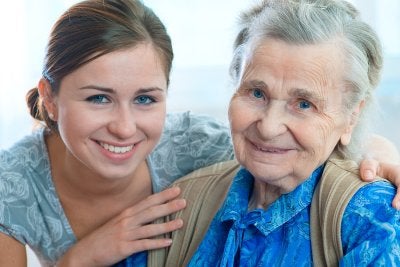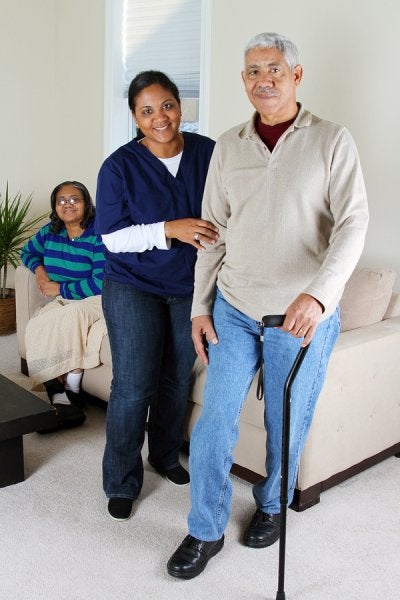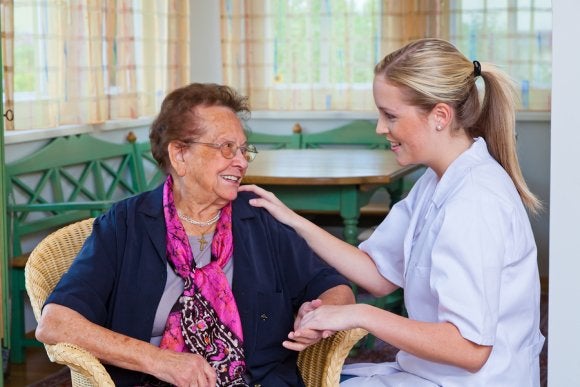-
How Caregiving Affects Women
Elder care affects the whole family, but women in particular tend to carry a large part of the burden. If you are contemplating issues surrounding elder care in Memphis for a loved one in your family, this video offers some insight into the impact of the issue on women.
Women tend to take the lead when it comes to elder care for loved ones because of the roles that women traditionally play in families. This can leave women carrying a great deal of the responsibility at the expense of their own well-being. If a woman in your family is devoting her time to acting as a caregiver, consider contacting a home health aide to help shoulder some of the work and give your family member time to care for herself and her own needs.
-
Helping Your Loved One Transition Home from a Stroke Rehab Facility
Because of the damaging effects of stroke, many patients spend a period of time in an in-patient rehab facility in the period immediately following the incident. Eventually, most patients will transition out of the rehab facility and back to home. Although you may welcome the opportunity to have your loved one home again, it is important to plan carefully to make the transition as easy as possible. Hiring an in-home caregiver in Memphis to assist with transitional care can be enormously helpful. These tips will help you prepare for this new kind of care as well.

Identify the Goals
Although your loved one is leaving the rehab facility, he or she likely still needs to be engaged in a treatment plan. Decide on a set of short-term and long-term goals to help your loved one get stronger, and learn strategies you can use at home to support the progress. Physical, occupational, and speech therapy may be needed on an outpatient basis, so determine a schedule and find out if there are any exercises you should be doing between appointments. Make sure your in-home caregiver also understands these goals and how to help your loved one meet them.
Prepare the Home
The rehab center staff can explain to you the kind of care your loved one will need and offer advice about preparing your home for the transition. For instance, you may need to set up a bedroom downstairs for your loved one or remove trip hazards from walking paths through the home. The earlier you start preparing your home, the easier your job as caregiver will be and the safer your home will be for your loved one.
Ask for Help
During the transition, you will need help. Recognize that asking for help when you need it makes you a better caregiver. Explore your options, from having a family member take over care one day per week so you can do errands to hiring an in-home caregiver for assisted living services. Arranging help before your loved one returns home can ensure a smoother transition.
-
Preventing Medication Overdoses in Seniors
Medication assistance is often a key part of elder care in Memphis . Most seniors take some kind of medication. Whether it is a prescription heart medicine or regular insulin for diabetes, almost all seniors take at least one pill daily. Often, these prescription drugs are essential to their very lives. Unfortunately, as they age, seniors become increasingly likely to either forget their medicine or accidentally overdose. Read on to learn how you can help prevent a dangerous medication overdose in your senior loved ones by using medication management, hiring caregiving help, and checking prescription safety.

Use Medication Management
Medication management is often essential for elderly care. To prevent medication overdoses, consider investing in modern medication management tools to remind yourself and your senior loved one of how much medicine to take and when. Many bill bottles come with different compartments for days of the week. Modern pill bottles are also equipped with alarms and even electronic disbursement systems, so your loved one and his or her caretaker know which pill to take. Many medications must be taken at the same time each day, which means these systems are integral.
Hire Caregiving Help
Hiring caregiving help is one of the best ways to prevent medication overdoses. Many seniors become forgetful with age, whether it is due to a neurological condition like dementia or as a natural side effect of the aging process. When you hire elderly care help, you can count on your loved one taking the correct dose of medication every time. Otherwise, seniors could forget that they have already taken a pill or how much was ingested.
Check Prescription Safety
Whether you are the primary caregiver or hire caring companions to assist with administering medication, you should always remain vigilant when it comes to the medications your senior loved one has been prescribed. Many people visit different doctors for different ailments. Make sure that all your loved one’s physicians, including dentists and psychiatrists, are aware of all medications that have been prescribed. This will ward off both accidental overdose and bad medication interactions.
-
A Look at Falls in Senior Citizens
A Look at Falls in Senior Citizens
Because seniors are often prone to falls, it’s important to regularly evaluate your loved one’s need for elderly care in Memphis . Seniors are at risk for a number of health conditions that can make them more prone to tripping, losing their balance, and falling, both in and out of the home. Here is a look at the causes, complications, and prevention of falls in senior citizens.

Common Causes of Falls
When caring for elders, it’s important to be aware of the common causes of falls. Seniors can develop muscle or spinal problems that make it difficult for them to keep their balance or walk. They can also develop vision problems, which make it hard for them to see obstacles in their paths. Low blood pressure and low blood sugar may cause dizziness upon standing, resulting in a fall. Senior citizens are also at a higher risk of dementia, foot problems, sensory problems, and poor reflexes, all of which may cause a fall.
Complications of Falls
A fall can cause serious complications for an elderly loved one, which is why it is so important to seek elderly care or senior assisted living services if you believe that your loved on is at risk of a fall. If your loved one has osteoporosis or a spinal condition, he can break or fracture bones easily even after a minor fall. He may also suffer from severe bruises, contusions, or head injuries that can increase his risk of infection or other motor problems. If your loved one lives alone without the support of a home health aide, a fall can prove to be catastrophic.
How to Prevent Falls
The best way to prevent falls is to hire a home health aide or in-home caregiver for your loved one. You should also ensure that pathways are clear of obstacles, and that the home has proper lighting. Carpeting, flooring, and stairways should be maintained so that they don’t cause accidents. If your loved one has health conditions that may cause a fall, he may need senior assisted living services.
-
Should Your Senior Loved One Stay Home Unattended?
One of the most difficult decisions every family will face some day is how best to care for aging loved ones. Elderly care can often be a contentious topic for families, as seniors typically desire to stay at home, while their loved ones worry for their safety. Although seniors may be initially hesitant to acquiesce to elderly care, there is a solution that can meet everyone’s needs: in-home care. With in-home care, a caregiver helps your senior loved one stay independent in the familiar surroundings of home, providing as much care needed. Learn more about in-home care in this infographic from Caring Companions . We provide in-home care in Memphis and can help you find the right solution for your loved one’s need. Call us to discuss your concerns and find out which service may be right for you. Every family will contend with this choice some day, so please share this information.

-
Identifying the Signs of Alzheimer’s Disease
It’s important to identify the early warning signs of Alzheimer’s disease so that your loved one can receive dementia home care near Memphis as soon as possible. While there is no cure for Alzheimer’s disease, early intervention can potentially slow the progression of symptoms. If your loved one is unable to care for himself due to his Alzheimer’s symptoms, you should hire a home health aide or in-home caregiver for assistance.
Watch this video for valuable information about identifying the early signs and symptoms of Alzheimer’s disease. You’ll get step by step instructions about recognizing the most common Alzheimer’s symptoms so that you can get your loved one dementia care.
-
Dealing with a Change in Care Providers
There are many reasons why your loved one may need to transition to a new elder care provider. His or her current caregiver may be moving away or your loved one’s needs may change , for example. If your loved one’s caregiver agency near Memphis notifies him or her that a new caregiver will be assisting him or her, your loved one may need some time to adjust to the new arrangement. Ideally, your loved one will know of the transition well in advance. You can reassure your loved one that the new in-home care provider will be just as kind, compassionate, and competent in providing elder care as the previous caregiver.
If possible, it can be helpful to introduce your loved one to the new elder care provider before the transition occurs. The two caregivers can spend some time together with your loved one to help the new caregiver learn about your loved one’s preferences, routines, and needs. This also allows your loved one to feel more comfortable with the new caregiver and to begin to form a new emotional attachment.

-
Helping Seniors Adjust to At-Home Care
If you have an elderly loved one who is in need of in-home care near Memphis , you may need to help him adjust to the idea of using a caregiver or home health aide. Using an in-home caregiver allows your loved one to remain in the comfort of his own home, rather than moving into a senior assisted living facility or nursing home. Here are some tips for helping seniors adjust to in-home care from a caregiver.

Make Time to Listen Discuss Feelings and Concerns
Your loved one may have a lot of feelings and concerns to discuss with you regarding in-home care from a home health aide. You should be patient with your loved one, and directly address all of his concerns. You may even want to consult with a counselor or therapist who has experience caring for elders. He or she can help you mediate and calm your loved one’s anxiety or fear. Your loved one will feel much better about home health care if he feels that his feeling are being acknowledged and addressed.
Go Over Your Role and the Caregiver’s Role in the Household
Once you hire a home health aide, your role as a primary caregiver will change. You should be sure that your loved one understands how certain duties will be divided between you and the new in-home caregiver. Your loved one may feel more comfortable if you perform certain tasks, rather than the caregiver, until he gets to know his caregiver better. You will most likely remain the mediator between your loved one and the caregiver for a period of time as they both adjust.
Help Your Loved One Prepare His Home for In-Home Care
Before the in-home caregiver’s first day, you and your loved one should prepare his home for the visit. Your loved one may want to rearrange certain things to maintain his privacy, and may want to designate some rooms or areas of the home as off-limits to the caregiver. You should also make sure that any items that the caregiver needs are easily accessible.
-
Making Home Safer for Seniors
As your loved one grows older, it’s a good idea to assess his or her home for potential safety hazards. Consider visiting a caregiver agency near Memphis to discuss your loved one’s elderly care needs. A home health aide can help you make your loved one’s home safer by pointing out areas that need better lighting or by recommending modifications to the bathroom. For instance, placing red and blue buttons on the hot and cold water faucets can prevent scalding injuries. The caregiver may also recommend making sure the bathroom lock can be disengaged from other side, just in case your loved one experiences an emergency and needs help.
Watch this video for more helpful tips on elder care and home safety. It reminds family members of the importance of keeping smoke and carbon monoxide alarms in good working condition and of keeping a fire extinguisher in the kitchen.
-
Spotting the Early Indicators of Alzheimer’s Disease
If you believe that your loved one is suffering from dementia near Memphis, you should seek help from an assisted living agency as soon as possible. Dementia home care services will ensure that your loved one remains safe, healthy, and cared for when he cannot care for himself. Here are some of the early indicators of Alzheimer’s disease and dementia that may indicate that your loved one could benefit from dementia home care .

Gradually Worsening Memory Loss
As we age, we all begin to suffer from a certain degree of memory loss or have difficulty remembering things. However, dementia symptoms include a gradually worsening memory loss that is obviously abnormal and markedly different from occasionally misplacing your keys or forgetting an important appointment. With dementia, memory problems are the first and most obvious sign of the disease. You may notice that your loved one frequently forgets dates, events, new information, people’s names, addresses, and directions.
Cognitive Impairment
Dementia is a chronic condition that gradually causes the neurons in the brain to deteriorate, causing significant cognitive impairment. As dementia progresses, your loved one’s attention span, concentration, judgment, ability to plan, and decision making skills will become severely disturbed. He may not be able to follow a recipe, make simple decisions, or keep track of his monthly expenses. You will notice that your loved one is either falling behind on necessary chores, or frequently asking for help with completing them.
Severe Changes in Personality and Mood
As dementia symptoms worsen, your loved one will exhibit dramatic changes in personality and mood. In some cases, personality changes develop prior to symptoms of cognitive impairment, or they may develop in response to cognitive problems. Personality and mood changes are also often the symptom that prompts family members to seek dementia home care or senior assisted living services. Your loved one may suddenly seem apathetic, emotionally flat, unexpressive, and indifferent to his surroundings. He may also have bursts of fear, anger, and paranoia. Depression and anxiety are also common mood swings associated with dementia.
